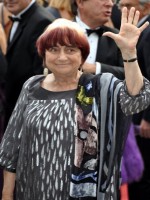Serge Gainsbourg is a Actor, Director, Scriptwriter and Sound French born on 2 april 1928 at Paris (France)

Serge Gainsbourg (born Lucien Ginsburg; [sɛʁʒ ɡɛ̃sbuʁ]; 2 April 1928 – 2 March 1991) was a French singer, songwriter, pianist, film composer, poet, painter, screenwriter, writer, actor, and director. Regarded as one of the most important figures in French popular music, he was renowned for his often provocative and scandalous releases, as well as his diverse artistic output, which embodied genres ranging from jazz, mambo, world, chanson, pop and yé-yé, to rock and roll, progressive rock, reggae, electronic, disco, new wave, and funk. Gainsbourg's varied musical style and individuality make him difficult to categorize although his legacy has been firmly established and he is often regarded as one of the world's most influential popular musicians.
His lyrical work incorporated a vast amount of clever word play to hoodwink the listener, often for humorous, provocative, satirical or subversive reasons. Common types of word play in his songs include mondegreen, onomatopoeia, rhyme, spoonerism, dysphemism, paraprosdokian and pun. Through the course of his career, Gainsbourg wrote over 550 songs, which have been covered more than a thousand times by a wide range of artists. Since his death, Gainsbourg's music has reached legendary stature in France. He has also gained a cult following in the English-speaking world, with numerous artists influenced by his arrangements.
Gainsbourg's childhood was profoundly affected by the occupation of France by Germany in World War II. The identifying yellow star Jews were required to wear became a symbol and haunted Gainsbourg and which in later years he was able to transmute into creative inspiration. During the occupation, the Jewish Ginsburg family was able to make their way from Paris to Limoges, traveling under false papers. Limoges was in the Zone libre under the administration of the collaborationist Vichy government and still a perilous refuge for Jews. After the war, Gainsbourg obtained work teaching music and drawing in a school outside of Paris, in Mesnil-Le-Roi. The school was set up under the auspices of local rabbis, for the orphaned children of murdered deportees. Here Gainsbourg heard the accounts of Nazi persecution and genocide, stories that resonated for Gainsbourg far into the future. Before he was 30 years old, Gainsbourg was a disillusioned painter but earned his living as a piano player in bars.
Gainsbourg changed his first name to Serge, feeling that this was representative of his Russian background and because, as Jane Birkin relates: "Lucien reminded him of a hairdresser's assistant." He chose Gainsbourg as his last name, in homage to the English painter Thomas Gainsborough, whom he admired.
He married Elisabeth "Lize" Levitsky on 3 November 1951 and divorced in 1957. He married a second time on 7 January 1964, to Françoise-Antoinette "Béatrice" Pancrazzi (b. 28 July 1931), with whom he had two children: a daughter named Natacha (b. 8 August 1964) and a son, Paul (born in spring 1968). He divorced Béatrice in February 1966.
In late 1967 he had a short but ardent love affair with Brigitte Bardot, to whom he dedicated the song and album Initials BB.
In mid-1968 Gainsbourg fell in love with the younger English singer and actress Jane Birkin, whom he met during the shooting of the film Slogan. Their relationship lasted over a decade. In 1971 they had a daughter, the actress and singer Charlotte Gainsbourg. Although many sources state that they were married, according to their daughter Charlotte this was not the case. Birkin left Gainsbourg in 1980.
Birkin remembers the beginning of her affair with Gainsbourg: he first took her to a nightclub, then to a transvestite club and afterwards to the Hilton hotel where he passed out in a drunken stupor. Birkin left Gainsbourg when pregnant with her third daughter Lou by the film director Jacques Doillon.
His last partner was Bambou (Caroline Paulus, grandniece of German field marshal Friedrich Paulus of Stalingrad fame). In 1986, they had a son, Lucien (known as Lulu).
In 2010, Lise Lévitzky published a book called "Lise et Lulu" which raises the possibility of the homosexuality of Serge Gainsbourg.
Early work
His early songs were influenced by Boris Vian and were largely in the vein of old-fashioned chanson.
Around 1957 he backed the Parisian "Cabaret Milord l'Arsouille" star, singer Michèle Arnaud.
She discovered a shy songwriter, who considered his compositions too modern and provocative for mainstream chanson.
Arnaud offered to sing and even record such songs, and propelled his early career.
Later Gainsbourg began to move beyond this and experiment with a succession of musical styles: modern jazz early on, yé-yé and brit-pop in the 1960s, funk, rock and reggae in the 1970s and electronica in the 1980s.
Many of his songs contained themes with a bizarre, morbid or sexual twist in them. An early success, "Le Poinçonneur des Lilas", describes the day in the life of a Paris Métro ticket man, whose job is to stamp holes in passengers' tickets. Gainsbourg describes this chore as so monotonous, that the man eventually thinks of putting a hole into his own head and being buried in another.
By the time the yéyés arrived in France, Gainsbourg was 32 years old and was not feeling very comfortable: he spent much time with Jacques Brel or Juliette Greco but the public and critics rejected him, mocking his prominent ears and nose. During this period, Gainsbourg began working with Greco, a collaboration that lasted throughout the 'Left Bank' period culminating in the song La Javanaise in the fall of 1962.
He performed a few duets in 1964 with the artist Philippe Clay, with whom he shared some resemblance. Around this time, Gainsbourg met Elek Bacsik and Michel Gaudry and asked them to make a record with him. This would become Confidentiel, which exuded a modern jazz aesthetic that pleased Gainsbourg, despite knowing that such a sound would not allow him access to success. The album sold only 1,500 copies. The decision was taken right upon leaving the studio: "I'll get into hack work and buy myself a Rolls". Still, his next album, Gainsbourg Percussions, inspired by the rhythms and melodies of Miriam Makeba and Babatunde Olatunji, was a world away from the yéyé wave, on the scene which was to become a key to the Gainsbourg fortune.
More success began to arrive when, in 1965, his song Poupée de cire, poupée de son was the Luxembourg entry in the Eurovision Song Contest. Performed by French teen and charming singer France Gall, it won first prize. The song was recorded in English as "A Lonely Singing Doll" by British teen idol Twinkle.
His next song for Gall, Les Sucettes (Lollipops), caused a scandal in France: Gainsbourg had written the song with double-meanings and strong sexual innuendo of which the singer was apparently unaware when she recorded it. Whereas Gall thought that the song was about a girl enjoying lollipops, it was actually about oral sex. The controversy arising from the song, although a big hit for Gall, threw her career off-track in France for several years.
Gainsbourg arranged other Gall songs and LPs that were characteristic of the late 1960s psychedelic styles, among them Gall's 1968 album. Another one of Serge's songs Boum Bada Boum, was entered by Monaco in the 1967 contest, sung by Minouche Barelli; it came fifth. He also wrote hit songs for other artists, such as Comment Te Dire Adieu for Françoise Hardy, Anna Karina (Sous le soleil exactement, Ne dis rien) and his lifelong friend and muse-égérie, Michèle Arnaud (Les Papillons Noirs).
His relationship with Brigitte Bardot led to a series of prominent pop duets, such as Ford Mustang and Bonnie and Clyde.
In 1969, he released Je t'aime... moi non plus, which featured explicit lyrics and simulated sounds of female orgasm. The song appeared that year on an LP, Jane Birkin/Serge Gainsbourg. Originally recorded with Brigitte Bardot, it was released with his future girlfriend Birkin when Bardot backed out. While Gainsbourg declared it the "ultimate love song", it was considered too "hot"; the song was censored or banned from public broadcast in numerous countries and in France even the toned-down version was suppressed. The Vatican made a public statement citing the song as offensive. Despite (or perhaps because of) the controversy, it sold well and charted within the top ten in many European countries.
The 1970s
Histoire de Melody Nelson was released in 1971. This concept album, produced and arranged by Jean-Claude Vannier, tells the story of a Lolita-esque affair, with Gainsbourg as the narrator. It features prominent string arrangements and even a massed choir at its tragic climax. The album has proven influential with artists such as Air, David Holmes, Jarvis Cocker, Beck and Dan the Automator.
In 1975, he released the album Rock Around the Bunker, an album written entirely on the subject of National Socialism. Gainsbourg used black comedy, as he and his family had suffered during World War II, being forced to wear the yellow star as the mark of a Jew. Rock Around the Bunker belonged to the mid-1970s "retro" trend.
The next year saw the release of another major work, L'Homme à tête de chou (Cabbage-Head Man), featuring the new character Marilou and sumptuous orchestral themes. Cabbage-Head Man is one of his nicknames, as it refers to his ears. Musically, L'homme à tête de chou turned out to be Gainsbourg's last LP, in the English rock style he had favoured since the late 1960s. He would go on to produce two reggae albums recorded in Jamaica (1979 and 1981) and two electronic funk albums recorded in New York (1984 and 1987).
In Jamaica in 1979, he recorded "Aux Armes et cætera", a reggae version of the French national anthem "La Marseillaise", with Robbie Shakespeare, Sly Dunbar and Rita Marley. Following harsh and anti-semitic criticism in right-wing newspaper Le Figaro by Charles de Gaulle biographer Michel Droit, his song earned him death threats from right-wing veteran soldiers of the Algerian War of Independence, who were opposed to their national anthem being arranged in reggae style. In 1979, a show had to be cancelled, because an angry mob of French Army parachutists came to demonstrate in the audience. Alone onstage, Gainsbourg rose his fist and answered "The true meaning of our national anthem is revolutionary" and sung it with the audience. The soldiers joined them, a scene enjoyed by millions as French TV news broadcast it, creating more publicity. Shortly afterward, Gainsbourg bought the original manuscript of "La Marseillaise". He replied to his critics that his version was, in fact, closer to the original as the manuscript clearly shows the words "Aux armes et cætera..." for the chorus. This fine album, described by legendary drummer Sly Dunbar as "Perhaps the best record he ever played on" was his biggest commercial success, including major hits Lola Rastaquouère, Aux Armes Et Cætera and a French version of Sam Theard's jazz classic You Rascal You entitled Vieille Canaille. Rita Marley and the I-Three would record another controversial reggae album with him in 1981, Mauvaises nouvelles des étoiles. Bob Marley was furious, when he discovered that Gainsbourg made his wife Rita sing erotic lyrics. Posthumous new mixes, including dub versions by Soljie Hamilton and versions of both albums by Jamaican artists were released as double "Dub Style" albums in 2003, to critical praise in France as well as abroad and to international commercial success. Although belatedly, Aux Armes Et Cætera – Dub Style and Mauvaises Nouvelles Des Étoiles – Dub Style further posthumously established Gainsbourg as an influential icon in European pop music.
Final years
In 1982, Gainsbourg wrote an album for French rocker Alain Bashung, Play blessures. The album, although now considered a masterpiece by French critics, was a commercial failure.
After a turbulent 13-year relationship, Jane Birkin left Gainsbourg. In the 1980s, near the end of his life, Gainsbourg became a regular figure on French TV. His appearances seemed devoted to his controversial sense of humour and provocation. In March 1984, he burned three-quarters of a 500 French franc bill on television to protest against taxes raising up to 75% of income.
He would show up drunk and unshaven on stage: in April 1986, on Michel Drucker's live Saturday evening show, with the American singer Whitney Houston, he objected to Drucker's translating his comments to Whitney Houston and in English stated: "I said, I want to fuck her" - Drucker insisted this meant "He says you are great..." The same year, in another talk show interview, he appeared alongside Catherine Ringer, a well known singer who had appeared in pornographic films. Gainsbourg spat out at her, "You're nothing but a filthy whore, a filthy, fucking whore".
His songs became increasingly eccentric during this period, ranging from the anti-drug Aux Enfants de la Chance, to the highly controversial duet with his daughter Charlotte named Lemon Incest. This translates as "Inceste de citron", a wordplay on "un zeste de citron" (a lemon zest). The title demonstrates Gainsbourg's love for puns – another example of which is Beau oui comme Bowie, a song he gave to Isabelle Adjani.
By December 1988, while a judge at a film festival in Val d'Isère, he was extremely intoxicated at a local theatre where he was to do a presentation. While on stage he began to tell an obscene story about Brigitte Bardot and a champagne bottle, only to stagger offstage and collapse in a nearby seat. Subsequent years saw his health deteriorate. He had to undergo liver surgery but denied any connection to cancer or cirrhosis. His appearances and releases became sparser as he had to rest and recover in Vezelay. During these final years, he released Love on the Beat, a controversial electronic album with mostly sexual themes in the lyrics and his last studio album, You're Under Arrest, presented more synth-driven songs.
Film work
Acting
Gainsbourg appeared in nearly 50 film and television roles. In 1960, he co-starred with Rhonda Fleming in the Italian film La rivolta degli schiavi (The Revolt of the Slaves) as Corvino, the Roman Emperor Massimiano's evil henchman. In 1968 he wrote music for and appeared as himself in Le Pacha directed by Georges Lautner. In 1969, he appeared in William Klein's pop art satire Mr. Freedom, and in the same year he starred with Jane Birkin in Les Chemins de Katmandou (The Pleasure Pit). They acted together again in Cannabis the following year, and again in Seven Deaths in the Cat's Eye in 1973, and he also made a brief appearance with Birkin in Herbert Vesely's 1980 film, Egon Schiele – Exzess und Bestrafung.
He co-starred alongside Birkin in the French film Slogan for which he wrote the title song "La Chanson de Slogan". Also with Birkin, he acted in the French-Yugoslav film Devetnaest djevojaka i jedan mornar (19 girls and one sailor) where he played a role of a partisan.
Directing
Gainsbourg directed five movies: Je t'aime ... moi non plus, Le Physique et le Figuré, Équateur, Charlotte for Ever, and Stan the Flasher.
Composing
Throughout his career, Gainsbourg wrote the soundtracks for nearly 60 films and television programs. In 1996, he received a posthumous César Award for Best Music Written for a Film for Élisa, along with Zbigniew Preisner and Michel Colombier.
Writing
Gainsbourg wrote a novel entitled Evguénie Sokolov.
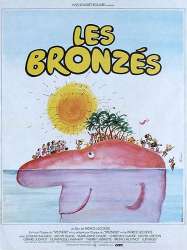 (1978)
(1978)
(Original Music Composer) (1995)
(1995)
(Original Music Composer) (1977)
(1977)
(Music)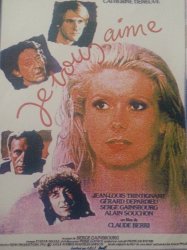 (1980)
(1980)
(Actor) (1986)
(1986)
(Original Music Composer) (1970)
(1970)
(Original Music Composer)
Source : Wikidata
Serge Gainsbourg

- Infos
- Photos
- Best films
- Family
- Characters
- Awards
Birth name Lucien Ginsburg
Nationality France
Birth 2 april 1928 at Paris (France)
Death 2 march 1991 (at 62 years) at Paris (France)
Nationality France
Birth 2 april 1928 at Paris (France)
Death 2 march 1991 (at 62 years) at Paris (France)
Serge Gainsbourg (born Lucien Ginsburg; [sɛʁʒ ɡɛ̃sbuʁ]; 2 April 1928 – 2 March 1991) was a French singer, songwriter, pianist, film composer, poet, painter, screenwriter, writer, actor, and director. Regarded as one of the most important figures in French popular music, he was renowned for his often provocative and scandalous releases, as well as his diverse artistic output, which embodied genres ranging from jazz, mambo, world, chanson, pop and yé-yé, to rock and roll, progressive rock, reggae, electronic, disco, new wave, and funk. Gainsbourg's varied musical style and individuality make him difficult to categorize although his legacy has been firmly established and he is often regarded as one of the world's most influential popular musicians.
His lyrical work incorporated a vast amount of clever word play to hoodwink the listener, often for humorous, provocative, satirical or subversive reasons. Common types of word play in his songs include mondegreen, onomatopoeia, rhyme, spoonerism, dysphemism, paraprosdokian and pun. Through the course of his career, Gainsbourg wrote over 550 songs, which have been covered more than a thousand times by a wide range of artists. Since his death, Gainsbourg's music has reached legendary stature in France. He has also gained a cult following in the English-speaking world, with numerous artists influenced by his arrangements.
Biography
Born in Paris, France, Gainsbourg was the son of Jewish Ukrainian migrants, Joseph Ginsburg (28 December 1898, in Kharkov, now Ukraine then Russian Empire – 22 April 1971) and Olga (née Bessman; 1894 – 16 March 1985), who fled to Paris after the 1917 Russian Revolution. Joseph Ginsburg was a classically trained musician whose profession was playing the piano in cabarets and casinos; he taught his children, Gainsbourg and his twin sister Liliane to play the piano.Gainsbourg's childhood was profoundly affected by the occupation of France by Germany in World War II. The identifying yellow star Jews were required to wear became a symbol and haunted Gainsbourg and which in later years he was able to transmute into creative inspiration. During the occupation, the Jewish Ginsburg family was able to make their way from Paris to Limoges, traveling under false papers. Limoges was in the Zone libre under the administration of the collaborationist Vichy government and still a perilous refuge for Jews. After the war, Gainsbourg obtained work teaching music and drawing in a school outside of Paris, in Mesnil-Le-Roi. The school was set up under the auspices of local rabbis, for the orphaned children of murdered deportees. Here Gainsbourg heard the accounts of Nazi persecution and genocide, stories that resonated for Gainsbourg far into the future. Before he was 30 years old, Gainsbourg was a disillusioned painter but earned his living as a piano player in bars.
Gainsbourg changed his first name to Serge, feeling that this was representative of his Russian background and because, as Jane Birkin relates: "Lucien reminded him of a hairdresser's assistant." He chose Gainsbourg as his last name, in homage to the English painter Thomas Gainsborough, whom he admired.
He married Elisabeth "Lize" Levitsky on 3 November 1951 and divorced in 1957. He married a second time on 7 January 1964, to Françoise-Antoinette "Béatrice" Pancrazzi (b. 28 July 1931), with whom he had two children: a daughter named Natacha (b. 8 August 1964) and a son, Paul (born in spring 1968). He divorced Béatrice in February 1966.
In late 1967 he had a short but ardent love affair with Brigitte Bardot, to whom he dedicated the song and album Initials BB.
In mid-1968 Gainsbourg fell in love with the younger English singer and actress Jane Birkin, whom he met during the shooting of the film Slogan. Their relationship lasted over a decade. In 1971 they had a daughter, the actress and singer Charlotte Gainsbourg. Although many sources state that they were married, according to their daughter Charlotte this was not the case. Birkin left Gainsbourg in 1980.
Birkin remembers the beginning of her affair with Gainsbourg: he first took her to a nightclub, then to a transvestite club and afterwards to the Hilton hotel where he passed out in a drunken stupor. Birkin left Gainsbourg when pregnant with her third daughter Lou by the film director Jacques Doillon.
His last partner was Bambou (Caroline Paulus, grandniece of German field marshal Friedrich Paulus of Stalingrad fame). In 1986, they had a son, Lucien (known as Lulu).
In 2010, Lise Lévitzky published a book called "Lise et Lulu" which raises the possibility of the homosexuality of Serge Gainsbourg.
Early work
His early songs were influenced by Boris Vian and were largely in the vein of old-fashioned chanson.
Around 1957 he backed the Parisian "Cabaret Milord l'Arsouille" star, singer Michèle Arnaud.
She discovered a shy songwriter, who considered his compositions too modern and provocative for mainstream chanson.
Arnaud offered to sing and even record such songs, and propelled his early career.
Later Gainsbourg began to move beyond this and experiment with a succession of musical styles: modern jazz early on, yé-yé and brit-pop in the 1960s, funk, rock and reggae in the 1970s and electronica in the 1980s.
Many of his songs contained themes with a bizarre, morbid or sexual twist in them. An early success, "Le Poinçonneur des Lilas", describes the day in the life of a Paris Métro ticket man, whose job is to stamp holes in passengers' tickets. Gainsbourg describes this chore as so monotonous, that the man eventually thinks of putting a hole into his own head and being buried in another.
By the time the yéyés arrived in France, Gainsbourg was 32 years old and was not feeling very comfortable: he spent much time with Jacques Brel or Juliette Greco but the public and critics rejected him, mocking his prominent ears and nose. During this period, Gainsbourg began working with Greco, a collaboration that lasted throughout the 'Left Bank' period culminating in the song La Javanaise in the fall of 1962.
He performed a few duets in 1964 with the artist Philippe Clay, with whom he shared some resemblance. Around this time, Gainsbourg met Elek Bacsik and Michel Gaudry and asked them to make a record with him. This would become Confidentiel, which exuded a modern jazz aesthetic that pleased Gainsbourg, despite knowing that such a sound would not allow him access to success. The album sold only 1,500 copies. The decision was taken right upon leaving the studio: "I'll get into hack work and buy myself a Rolls". Still, his next album, Gainsbourg Percussions, inspired by the rhythms and melodies of Miriam Makeba and Babatunde Olatunji, was a world away from the yéyé wave, on the scene which was to become a key to the Gainsbourg fortune.
More success began to arrive when, in 1965, his song Poupée de cire, poupée de son was the Luxembourg entry in the Eurovision Song Contest. Performed by French teen and charming singer France Gall, it won first prize. The song was recorded in English as "A Lonely Singing Doll" by British teen idol Twinkle.
His next song for Gall, Les Sucettes (Lollipops), caused a scandal in France: Gainsbourg had written the song with double-meanings and strong sexual innuendo of which the singer was apparently unaware when she recorded it. Whereas Gall thought that the song was about a girl enjoying lollipops, it was actually about oral sex. The controversy arising from the song, although a big hit for Gall, threw her career off-track in France for several years.
Gainsbourg arranged other Gall songs and LPs that were characteristic of the late 1960s psychedelic styles, among them Gall's 1968 album. Another one of Serge's songs Boum Bada Boum, was entered by Monaco in the 1967 contest, sung by Minouche Barelli; it came fifth. He also wrote hit songs for other artists, such as Comment Te Dire Adieu for Françoise Hardy, Anna Karina (Sous le soleil exactement, Ne dis rien) and his lifelong friend and muse-égérie, Michèle Arnaud (Les Papillons Noirs).
His relationship with Brigitte Bardot led to a series of prominent pop duets, such as Ford Mustang and Bonnie and Clyde.
In 1969, he released Je t'aime... moi non plus, which featured explicit lyrics and simulated sounds of female orgasm. The song appeared that year on an LP, Jane Birkin/Serge Gainsbourg. Originally recorded with Brigitte Bardot, it was released with his future girlfriend Birkin when Bardot backed out. While Gainsbourg declared it the "ultimate love song", it was considered too "hot"; the song was censored or banned from public broadcast in numerous countries and in France even the toned-down version was suppressed. The Vatican made a public statement citing the song as offensive. Despite (or perhaps because of) the controversy, it sold well and charted within the top ten in many European countries.
The 1970s
Histoire de Melody Nelson was released in 1971. This concept album, produced and arranged by Jean-Claude Vannier, tells the story of a Lolita-esque affair, with Gainsbourg as the narrator. It features prominent string arrangements and even a massed choir at its tragic climax. The album has proven influential with artists such as Air, David Holmes, Jarvis Cocker, Beck and Dan the Automator.
In 1975, he released the album Rock Around the Bunker, an album written entirely on the subject of National Socialism. Gainsbourg used black comedy, as he and his family had suffered during World War II, being forced to wear the yellow star as the mark of a Jew. Rock Around the Bunker belonged to the mid-1970s "retro" trend.
The next year saw the release of another major work, L'Homme à tête de chou (Cabbage-Head Man), featuring the new character Marilou and sumptuous orchestral themes. Cabbage-Head Man is one of his nicknames, as it refers to his ears. Musically, L'homme à tête de chou turned out to be Gainsbourg's last LP, in the English rock style he had favoured since the late 1960s. He would go on to produce two reggae albums recorded in Jamaica (1979 and 1981) and two electronic funk albums recorded in New York (1984 and 1987).
In Jamaica in 1979, he recorded "Aux Armes et cætera", a reggae version of the French national anthem "La Marseillaise", with Robbie Shakespeare, Sly Dunbar and Rita Marley. Following harsh and anti-semitic criticism in right-wing newspaper Le Figaro by Charles de Gaulle biographer Michel Droit, his song earned him death threats from right-wing veteran soldiers of the Algerian War of Independence, who were opposed to their national anthem being arranged in reggae style. In 1979, a show had to be cancelled, because an angry mob of French Army parachutists came to demonstrate in the audience. Alone onstage, Gainsbourg rose his fist and answered "The true meaning of our national anthem is revolutionary" and sung it with the audience. The soldiers joined them, a scene enjoyed by millions as French TV news broadcast it, creating more publicity. Shortly afterward, Gainsbourg bought the original manuscript of "La Marseillaise". He replied to his critics that his version was, in fact, closer to the original as the manuscript clearly shows the words "Aux armes et cætera..." for the chorus. This fine album, described by legendary drummer Sly Dunbar as "Perhaps the best record he ever played on" was his biggest commercial success, including major hits Lola Rastaquouère, Aux Armes Et Cætera and a French version of Sam Theard's jazz classic You Rascal You entitled Vieille Canaille. Rita Marley and the I-Three would record another controversial reggae album with him in 1981, Mauvaises nouvelles des étoiles. Bob Marley was furious, when he discovered that Gainsbourg made his wife Rita sing erotic lyrics. Posthumous new mixes, including dub versions by Soljie Hamilton and versions of both albums by Jamaican artists were released as double "Dub Style" albums in 2003, to critical praise in France as well as abroad and to international commercial success. Although belatedly, Aux Armes Et Cætera – Dub Style and Mauvaises Nouvelles Des Étoiles – Dub Style further posthumously established Gainsbourg as an influential icon in European pop music.
Final years
In 1982, Gainsbourg wrote an album for French rocker Alain Bashung, Play blessures. The album, although now considered a masterpiece by French critics, was a commercial failure.
After a turbulent 13-year relationship, Jane Birkin left Gainsbourg. In the 1980s, near the end of his life, Gainsbourg became a regular figure on French TV. His appearances seemed devoted to his controversial sense of humour and provocation. In March 1984, he burned three-quarters of a 500 French franc bill on television to protest against taxes raising up to 75% of income.
He would show up drunk and unshaven on stage: in April 1986, on Michel Drucker's live Saturday evening show, with the American singer Whitney Houston, he objected to Drucker's translating his comments to Whitney Houston and in English stated: "I said, I want to fuck her" - Drucker insisted this meant "He says you are great..." The same year, in another talk show interview, he appeared alongside Catherine Ringer, a well known singer who had appeared in pornographic films. Gainsbourg spat out at her, "You're nothing but a filthy whore, a filthy, fucking whore".
His songs became increasingly eccentric during this period, ranging from the anti-drug Aux Enfants de la Chance, to the highly controversial duet with his daughter Charlotte named Lemon Incest. This translates as "Inceste de citron", a wordplay on "un zeste de citron" (a lemon zest). The title demonstrates Gainsbourg's love for puns – another example of which is Beau oui comme Bowie, a song he gave to Isabelle Adjani.
By December 1988, while a judge at a film festival in Val d'Isère, he was extremely intoxicated at a local theatre where he was to do a presentation. While on stage he began to tell an obscene story about Brigitte Bardot and a champagne bottle, only to stagger offstage and collapse in a nearby seat. Subsequent years saw his health deteriorate. He had to undergo liver surgery but denied any connection to cancer or cirrhosis. His appearances and releases became sparser as he had to rest and recover in Vezelay. During these final years, he released Love on the Beat, a controversial electronic album with mostly sexual themes in the lyrics and his last studio album, You're Under Arrest, presented more synth-driven songs.
Film work
Acting
Gainsbourg appeared in nearly 50 film and television roles. In 1960, he co-starred with Rhonda Fleming in the Italian film La rivolta degli schiavi (The Revolt of the Slaves) as Corvino, the Roman Emperor Massimiano's evil henchman. In 1968 he wrote music for and appeared as himself in Le Pacha directed by Georges Lautner. In 1969, he appeared in William Klein's pop art satire Mr. Freedom, and in the same year he starred with Jane Birkin in Les Chemins de Katmandou (The Pleasure Pit). They acted together again in Cannabis the following year, and again in Seven Deaths in the Cat's Eye in 1973, and he also made a brief appearance with Birkin in Herbert Vesely's 1980 film, Egon Schiele – Exzess und Bestrafung.
He co-starred alongside Birkin in the French film Slogan for which he wrote the title song "La Chanson de Slogan". Also with Birkin, he acted in the French-Yugoslav film Devetnaest djevojaka i jedan mornar (19 girls and one sailor) where he played a role of a partisan.
Directing
Gainsbourg directed five movies: Je t'aime ... moi non plus, Le Physique et le Figuré, Équateur, Charlotte for Ever, and Stan the Flasher.
Composing
Throughout his career, Gainsbourg wrote the soundtracks for nearly 60 films and television programs. In 1996, he received a posthumous César Award for Best Music Written for a Film for Élisa, along with Zbigniew Preisner and Michel Colombier.
Writing
Gainsbourg wrote a novel entitled Evguénie Sokolov.
Best films
 (1978)
(1978)(Original Music Composer)
 (1995)
(1995)(Original Music Composer)
 (1977)
(1977)(Music)
 (1980)
(1980)(Actor)
 (1986)
(1986)(Original Music Composer)
 (1970)
(1970)(Original Music Composer)
Usually with
Filmography of Serge Gainsbourg (65 films)
Actor

The Day the Clown Cried (1972)
Directed by Jerry Lewis, Jean-Jacques Beineix
Origin USA
Genres Drama
Themes Circus films, Films about religion, Political films, Films about Jews and Judaism
Actors Jerry Lewis, Harriet Andersson, Anton Diffring, Jonas Bergström, Ulf Palme, Pierre Étaix
Lewis plays a washed-up German circus clown named Helmut Doork during the beginning of World War II and the Holocaust. Although he was once a famous performer who toured America and Europe with the Ringling Brothers, Doork is now past his prime and receives little respect. After Doork causes an accident during a show, the head clown convinces the circus owner to demote Doork. Upon returning home, Doork confides his problems in his wife Ada, and she encourages him to stand up for himself. Helmut overhears the circus owner agreeing to fire him after the head clown issues an ultimatum. Helmut is distraught. He is arrested later by the Gestapo for ranting about Germany and drunkenly mocking Adolf Hitler in a bar. Following an interrogation at the Gestapo headquarters, he is imprisoned in a Nazi camp for political prisoners. For the next three to four years, he remains there while hoping for a trial and a chance to plead his case.
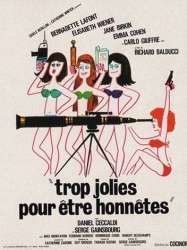
Seduction Squad (1972)
, 1h32Directed by Richard Balducci
Origin France
Genres Comedy
Actors Jane Birkin, Bernadette Lafont, Élisabeth Wiener, Emma Cohen, Carlo Giuffrè, Henri Virlogeux
Roles Albert
Rating50%





Quatre compagnes de chambrée sur la Côte d'Azur, Bernadette (Bernadette Lafont), Christine (Jane Birkin), Frédérique (Elisabeth Wiener) et Martine (Emma Cohen), découvrent qu'un groupe de voleurs se sert d'un édifice voisin pour stocker le produit de leurs vols. Elles décident alors de voler les voleurs.

The Rage of War (1971)
Genres Drama, War
Actors Serge Gainsbourg, Jane Birkin, Špela Rozin, Demeter Bitenc
Roles Mornar
Rating50%





Durant la Seconde Guerre mondiale, dans une région montagneuse de Yougoslavie, dix-neuf jeunes femmes conduites par un marin escortent des résistants blessés pour les soustraire à l'envahisseur nazi. Quelques-unes d'entre elles mourront en héroïnes afin que la mission soit menée à bien.

Romance of a Horsethief (1971)
, 1h41Directed by Abraham Polonsky
Origin USA
Genres Drama, Adventure, Historical
Actors Yul Brynner, Eli Wallach, Jane Birkin, Serge Gainsbourg, David Opatoshu, Henri Serre
Roles Sigmund
Rating51%





In Polish Russia, Stoloff, a Cossack in exile has gained control over a Jewish village. The villagers live by horse-thievery and under the leadership of Kifke. Stoloff's regime is tolerated until he commandeers the village's horses for the Russian army. Naomi has been away in France and gotten ideas of a revolution and inspires the town to resist. This gets Naomi into deep trouble, from which only Kifke and his compatriot Zanvil can rescue her. Zanvil is highly motivated since he is in love with Naomi.

Melody (1971)
, 28minutesGenres Musical, Romance
Themes Films about music and musicians, Musical films, Téléfilm musical
Actors Jane Birkin, Serge Gainsbourg
Roles L'homme
Rating76%





Il s’agit d’une série de vidéos entrelacées inspirées de l’album de Gainsbourg. En 1971, c’est un concept inédit pour donner vie à un LP, mais ce qui est encore plus surprenant, ce sont les visuels étonnants du court-métrage qu’Averty a réalisés à l’aide d’une multitude de filtres vidéo, de superpositions, de mouvements de caméra et d’effets chroma. Averty les applique en tandem avec le ton croissant des chansons de Gainsbourg, qui plus ou moins chroniquent la liaison d’un homme plus âgé avec une jeune fille. Chaque chanson est composée d’une prestation poétique constante, parfois inquiétante, avec des refrains chronométrés aux répétitions de phrase de chaque chanson, tandis que la guitare bourdonnant d’Alan Parker accompagne et se tortille autour de la voix résonante de Gainsbourg. La basse est grasse et groovy, la batterie facile mais stable, et l’utilisation périodique de cordes ou de vibrato riche rend ce court métrage comme un petit bijou sensuel.

Cannabis (1970)
, 1h35Directed by Pierre Koralnik
Origin France
Genres Drama, Thriller, Action, Crime
Themes Gangster films
Actors Curd Jürgens, Jane Birkin, Serge Gainsbourg, Paul Nicholas, Gabriele Ferzetti, Yvette Lebon
Roles Serge Morgan
Rating50%





Un gangster américain chargé d'un trafic de drogue en France fait la connaissance d'une jeune femme dont il tombe amoureux, et essaie de se racheter une conduite...

Erotissimo (1969)
, 1h35Directed by Gérard Pirès
Origin Italie
Genres Comedy
Actors Annie Girardot, Jean Yanne, Francis Blanche, Dominique Collignon-Maurin, Didi Perego, Venantino Venantini
Roles l'individu dragueur au cinéma
Rating54%





Annie mène avec son mari Philippe une existence conjugale paisible. Un jour, un article de presse l'amène à se poser la question : « Est-elle à la hauteur ? ». Il y est dit que l'épouse moderne doit être érotique. Annie s'interroge, d'autant que Philippe est préoccupé par le contrôle fiscal des comptes de son entreprise et semble distant. Elle va tout mettre en œuvre pour devenir l'épouse sexy tant vantée par la presse...
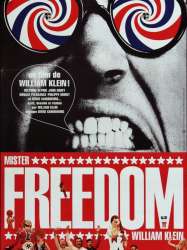
Mr. Freedom (1969)
, 1h45Directed by William Klein
Origin France
Genres Drama, Comedy
Themes Superhero films
Actors Delphine Seyrig, John Abbey, Donald Pleasence, Catherine Rouvel, Jean-Claude Drouot, Serge Gainsbourg
Roles M. Drugstore
Rating63%





Under the command of Dr. Freedom, the crass superhero Mr. Freedom (John Abbey) goes to France to stave off the advances of the mysterious French Anti-Freedom (FAF) organization. He joins forces with the femme fatale Marie-Madeleine to lead his own anti-communist Freedom organization. The Freedom mission is complicated by the machinations of communist foes — the Stalinist Moujik Man and the ferocious Maoist Red China Man (portrayed as a giant inflatable dragon). France, refusing to see the FAF as a threat, rebuffs Freedom, leading to an escalation of Cold War tactics. In the end, betrayed, Mr. Freedom destroys himself trying to save the "unappreciative" nation.

Katmandu (1969)
Directed by André Cayatte
Origin France
Genres Drama, Crime, Romance
Actors Serge Gainsbourg, Jane Birkin, Renaud Verley, Elsa Martinelli, Pascale Audret, Arlene Dahl
Roles Ted
Rating56%





Parti au Népal à la recherche de son père, Olivier fait la connaissance de Jane, dont il tombe amoureux. Mais cette jolie hippie sombre dans la drogue. Olivier est prêt à tout pour la sauver de cet enfer.
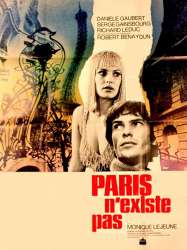
Paris Does Not Exist (1969)
, 1h57Origin France
Genres Drama, Science fiction
Actors Serge Gainsbourg, Richard Leduc, Danièle Gaubert, Monique Lejeune, Henri Déus, Grigori Chmara
Roles Laurent
Rating59%





Invité à une soirée, Simon, un artiste fume une substance aux propriétés hallucinogènes. Après cette expérience, il développe des capacités extrasensorielles qui lui permettent de voir non seulement dans l'espace mais aussi dans le futur et le passé. En retournant chez lui, Simon se met à voir la femme qui occupait l'appartement trente ans plus tôt. Un ami tente de le rassurer. Ces dons lui proviennent de sa sensibilité artistique à fleur de peau, rien de plus. Mais Simon n'est pas convaincu, car les hallucinations se font plus précises. Ces hallucinations menacent aussi bien sa vie personnelle, que professionnelle.

Slogan (1969)
, 1h30Directed by Pierre Grimblat
Origin France
Genres Drama, Comedy, Romance
Actors Serge Gainsbourg, Jane Birkin, Juliet Berto, Daniel Gélin, Henri-Jacques Huet, James Mitchell
Roles Serge
Rating58%





En plein festival à Venise, le réalisateur de publicité Serge Faberger rencontre et s'éprend d'une jeune Anglaise Evelyne. Il ne cache pas que sa femme attend un bébé. Cette situation se complique bientôt…
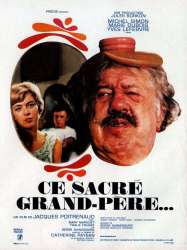 , 1h28
, 1h28Directed by Jacques Poitrenaud
Origin France
Genres Drama, Comedy, Comedy-drama
Themes La provence
Actors Michel Simon, Marie Dubois, Yves Lefebvre, Thalie Frugès, Serge Gainsbourg, Mary Marquet
Roles Rémy
Rating57%





Le grand-père Jéricho invite ses petits-enfants, le jeune couple Marie et Jacques, à passer quelques semaines de vacances avec lui dans sa maison provençale de Lourmarin. Il n'est pas dupe de l'image de bonheur que le couple lui joue, car Marie et Jacques sont séparés, Jacques partage désormais son existence avec Agathe, un mannequin. Le grand-père, en ravivant les souvenirs d'enfance du couple qui s'est formé par le passé à Lourmarin, va ranimer leur amour.
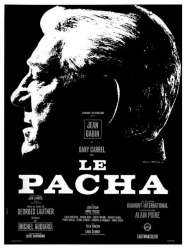
Pasha (1968)
, 1h22Directed by Georges Lautner
Origin France
Genres Drama, Crime
Themes Heist films, Gangster films, Escroquerie
Actors Jean Gabin, Dany Carrel, Robert Dalban, André Pousse, Maurice Garrel, Frédéric de Pasquale
Roles Serge Gainsbourg (uncredited)
Rating66%





L'inspecteur de police Albert Gouvion est chargé de convoyer une importante collection de bijoux d'une valeur inestimable. Mais un dangereux et perfide truand, Marcel Lurat, dit « Quinquin » et ses complices font sauter le fourgon blindé au bazooka avant de s'emparer du butin. Quinquin va tuer, un à un, ses complices, y compris Gouvion, dont le meurtre est maquillé en accident ou en suicide. Le commissaire divisionnaire Louis Joss, supérieur et ami de Gouvion, ne croit pas à la thèse de l'accident et veut le venger. Il entreprend le ménage dans le milieu parisien en organisant la rencontre de deux bandes rivales (dont l'une est dirigée par Quinquin) à l'occasion d'un braquage avec l'aide de la maîtresse de Gouvion, Nathalie Villar, jeune et belle serveuse dans une boîte de nuit et sœur de Léon de Lyon, un des complices éliminés par Quinquin après le braquage. L'inspecteur comprend que son vieux pote, (qu'il surnomme affectueusement « Albert, la galoche », « l'empereur des cons ») avait ce don de s'attirer les ennuis, toujours de pire en pire selon lui, s'impliquant par faiblesse au milieu des gangsters pour impressionner et plaire à sa séduisante maîtresse.
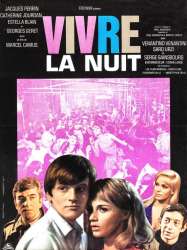
Love in the Night (1968)
, 1h40Directed by Marcel Camus
Origin France
Genres Drama
Actors Catherine Jourdan, Jacques Perrin, Estella Blain, Serge Gainsbourg, Georges Géret, Michel Creton
Roles Mathieu
Rating59%





Bourgoin utilise Philippe pour attirer la clientèle d'un autre établissement dans la boîte de nuit qu'il veut ouvrir à Pigalle.

The Looters (1967)
, 1h40Directed by Jacques Besnard
Origin France
Genres Adventure
Actors Frederick Stafford, Jean Seberg, Serge Gainsbourg, Maria-Rosa Rodriguez, Mario Pisu, Paul Crauchet
Roles Clyde
Rating52%





Sam Morgan, aventurier en villégiature, est enlevé par des partisans qui le contraignent à s'emparer de l'or d'un tyran d'Amérique du Sud pour financer leur révolution.
 Connection
Connection



